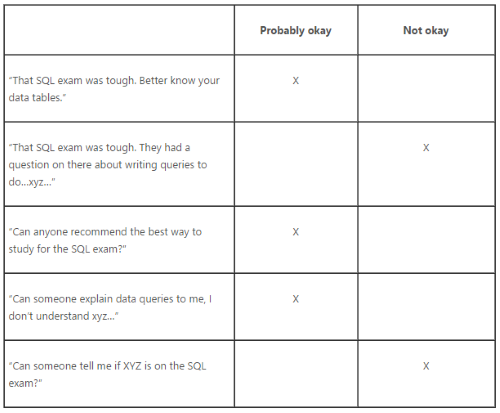In preparing, overseeing, and recommending quality cert prep materials, I always have to be keenly aware of the line that separates the "good stuff" from the stuff that oversteps the bounds of what's allowed, when it comes to such things. Today I saw a terrific blog on Microsoft's Born to Learn that draws that line as clearly and explicitly as I've ever seen anywhere. Please, let me explain...
Whenever you participate in any certification program, you must generally agree to a set of exam policies and a code of conduct before you can sit down and actually take a certification exam. Among the many precepts to which everyone must agree for the vast majority of such tests, and the programs that contain them is the idea that it's not allowed for those who take such tests to pass detailed, verbatim information about what's on the exam for the benefit of those who've yet to take it. One key concept that keeps popping up is the notion of "exam integrity" which means that enforcing a ban on such explicit disclosures keeps the exam from turning into purely an exercise in rote memorization. The real idea, after all, is to put people in a situation where they must use their hard-earned skills and knowledge to solve problems, answer questions, shoot trouble, and so forth.
Kerri Davis, who works as an "Anti-Piracy Product Manager" for Microsoft Learning, lays out some excellent ground rules in a post entitled "When Studying Behavior Equals Cheating." In that post, she zeroes in on what she calls "appropriate study group behavior" to illustrate that even asking questions or providing information, purely in the interests of wanting to learn (asking) or helping out others (providing info), can violate exam policies which forbid the sharing of detailed exam specifics, especially when it involves drawing on the observations of those who've taken a certification exam.
The idea is to keep things general, and to ask for recommendations on appropriate topics, pointers to good study materials, labs, practice tests, and so forth without crossing the line to indicate that "Topic X is on the exam" or "the question for Topic Y asks the test-taker to blah blah blah." Hopefully, you get the idea, but if not here's a table of example questions and information that she categorizes as "probably okay" (which means it's within what's allowed by the exam policies) and "not okay" (not allowed by the exam policies):

Nice illustrations of what's allowed, and what's not.
The key elements that violate policy include blatant disclosure of what appears in or on an exam, or specifics identified as explicit or verbatim exam content. There's nothing wrong with identifying what's important, what needs attention, areas where some candidates have trouble or often need extra work, and so forth. Problems occur when the line that identifies exam contents and related specifics get crossed. Stay on the right side of that line in your own study group activity, please, and steer clear of sources that tell you they deliver 100% accurate exam content ("real questions from the exam") and you'll be fine. Cross that line, however, and you could lose your certs (and all future access to the sponsor's cert programs) should those transgressions come to light.

